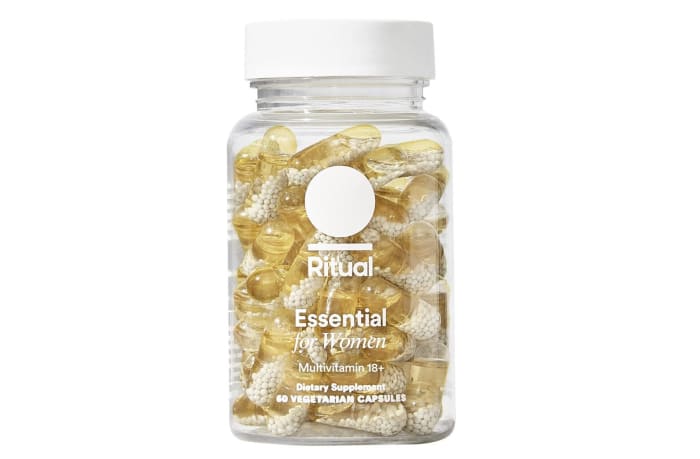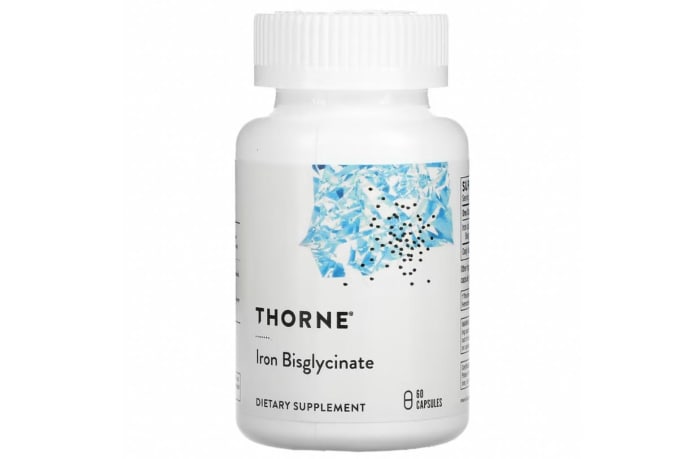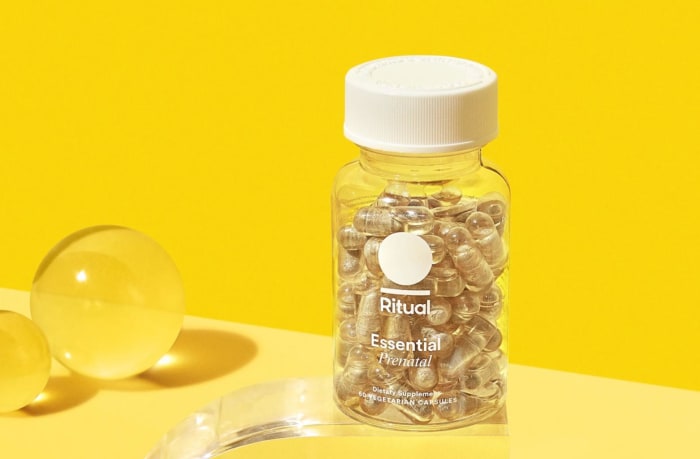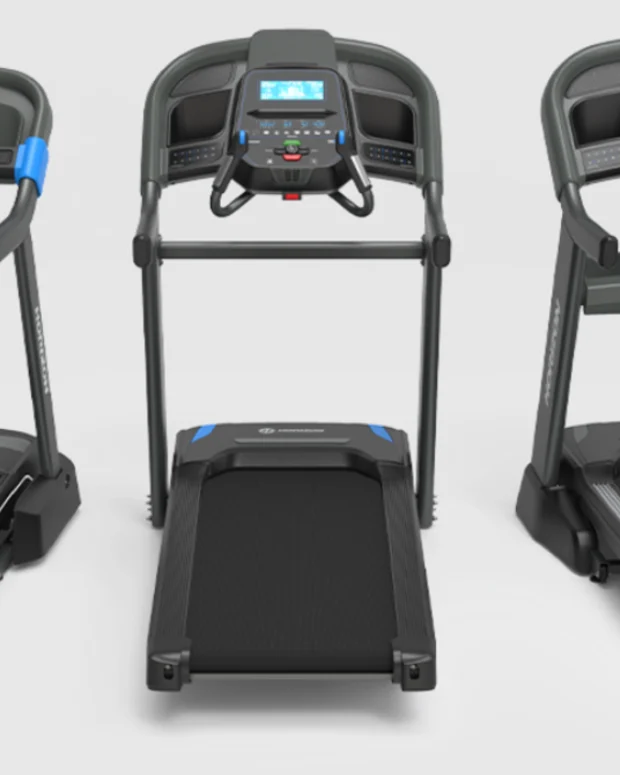The products featured in this article have been independently reviewed. When you buy something through the retail links on this page, we may earn commission at no cost to you, the reader. Sports Illustrated editorial staff are not involved in the creation of this content. Learn more here.
Meeting all of your body’s nutrient needs with a healthy, balanced diet and foods from all the major food groups is a worthy goal, but not everyone can meet their needs through diet alone. Multivitamins are a popular way to ensure that most of a person’s vitamin and mineral needs are met, but supplements of individual vitamins or minerals, like iron, are useful, too. Iron is a common nutrient deficiency, and it can cause fatigue, headache and even heart problems. To combat iron deficiency, many people take iron supplements.
Here, we’ll review our top picks for the best iron supplements, who should consider taking supplemental iron, signs of low iron and how much iron adults require to meet their needs. And, we’ll suggest factors to consider when selecting which iron supplement is right for you.
This content is meant to be informative, but should not be taken as medical advice. It is not intended for use as diagnosis, prevention or treatment of health problems. Always speak with your doctor before starting any new supplement or exercise regimen.
Our Picks for the Best Iron Supplements:
- Best Iron Supplement for Women: Ritual Essentials Multivitamin for Women 18+
- Best Organic Iron Supplement: Kaged Multivitamin
- Best Iron Supplement for Anemia: Thorne Iron Bisglycinate
- Best Iron Supplement for Vegans: Care/Of Iron
- Best Iron Supplement for Men: Kaged Multivitamin
- Best Iron Supplement for Pregnancy: Ritual Essentials Prenatal Vitamin
- Best Liquid Iron Supplement: California Gold Nutrition
- Best Iron Supplement for Sensitive Stomachs: Nature’s Bounty Gentle Iron
Best Iron Supplement for Women: Ritual Essentials for Women 18+
Key features:
- Type: Capsules
- Dose: Two Capsules
- Iron per dose: Eight milligrams
- Percent of Daily Value (DV): 44 percent
- Price: $33
- Certifications: Vegan, gluten and major allergy-free, USP verified
- Customer rating: 4.5/5
Ritual is a popular subscription-based supplement brand. The Ritual Essentials Multivitamin for Women 18+ is a good overall choice for a multivitamin for women.
This multivitamin contains eight milligrams of iron, which doesn’t meet the RDA for iron for women in most life stages—however, eight milligrams of iron would complement a balanced diet that already contains some food sources of iron. Additionally, the source of iron is ferrous bisglycinate, which is a well-tolerated form of iron.
Ritual formulates their vitamins with what they call “Made Traceable” ingredients. You can see where every ingredient in each product is sourced from. This supplement should work for most diet restrictions, as it's vegan, gluten-free and free of major allergens.
Related Post: Ritual Vitamins Review: Cost, Ingredients and More
Pros:
- Ritual conducted a randomized, placebo-controlled and double-blind trial on this multivitamin, which is not common for dietary supplement brand
- Third-party tested, USP verified
Cons:
- More costly than a typical drugstore multivitamin
- Available by subscription only
Best Organic Iron Supplement: Kaged Multivitamin
Key features:
- Type: Capsules
- Dose: Two capsules
- Iron per dose: 18 milligrams
- Percent of DV: 100 percent
- Price: $34.99
- Certifications: Non-GMO, gluten-free, Informed-Sport Certified
- Customer rating: 4.9/5
The Kaged Multivitamin is advertised as a whole-food multivitamin because the vitamins and minerals are sourced from organic fruits and vegetables. The benefits from fruits and vegetables typically come from eating the whole version of the food versus extracts or individual vitamins from the food. However, some people may prefer this supplement because they’ll know the sources of the nutrients they’re consuming.
This supplement contains 18 milligrams of iron, which meets the RDA for iron for all age adults (with the exception of pregnant women). In addition, this multivitamin contains 90 milligrams of Vitamin C, which may help with iron absorption.
Pros:
- Vitamins and minerals are sourced from organic fruits and vegetables
- Third-party tested
Cons:
- Larger serving size than other supplements
Best Iron Supplement for Anemia: Thorne Iron Bisglycinate
Key features:
- Type: Capsule
- Dose: One capsule
- Iron per dose: 25 milligrams
- Percent of DV: 139 percent
- Price: $14
- Certifications: Gluten-free, dairy-free, soy-free, NSF Certified for Sport
- Customer rating: 4.8/5
At 25 milligrams of iron, each Thorne Iron Bisglycinate capsule contains more than the recommended daily amount (RDA) for iron for all groups of adults, minus pregnant women. In addition, this high-quality iron supplement contains ferrous bisglycinate chelate, which is important because the chelated form of iron may help enhance the absorption of iron in the intestines.
Thorne’s products undergo several rounds of testing to ensure their quality, and they are also NSF Certified for Sport. For those with allergen concerns, Thorne Iron Bisglycinate does not contain gluten, soy or dairy.
Pros:
- Has several quality indicators, including a production facility that follows the Current Good Manufacturing Practices (cGMP)
- NSF Certified for Sport and undergoes four rounds of in-house testing
Cons:
- Contains some filler ingredients (ex: microcrystalline cellulose and silicon dioxide) that some people may dislike
Best Iron Supplement for Vegans: Care/Of Iron
Key features:
- Type: Capsule
- Dose: One capsule
- Iron per dose: 18 milligrams
- Price: $7
- Percent of DV: 100 percent
- Certifications: Certified C.L.E.A.N, non-GMO, vegan, gluten-free
- Customer rating: Rating not available
The Care/Of Iron supplement is vegan, organic and non-GMO. This supplement contains 18 milligrams of iron, which meets the RDA for all adult men and women, with the exception of pregnant women.
In this supplement, the iron source is ferrous bisglycinate chelate, which is an effective and well-tolerated version of iron. Also, the Care/Of iron contains 30 milligrams of Vitamin C, which may help increase the absorption of iron.
This supplement is free from eggs, fish, milk, peanut, sesame, shellfish, soy, tree nuts and wheat. The company reports testing its products three times during manufacturing, including by a third party at the end of the process.
Pros:
- Meets the iron RDA for adults
- Vegan, organic and non-GMO
- Third-party tested and manufactured with quality standards in mind
Cons:
- Subscription-based supplement with shipping charges if minimums aren’t met
Best Iron Supplement for Men: Kaged Multivitamin
Key features:
- Type: Capsules
- Dose: Two capsules
- Iron per dose: 18 milligrams
- Price: $34.99
- Percent of DV: 100 percent
- Certifications: Non-GMO, gluten-free, Informed-Sport Certified
- Customer rating: 4.9/5
The Kaged multivitamin is a good multivitamin choice for men. In addition to a variety of other vitamins and minerals sourced from organic fruits and vegetables, this supplement contains 18 milligrams of iron. The RDA for men ages 18 and up is eight milligrams per day, so this supplement will support men’s daily iron needs.
For men involved in competitive sports or simply looking for a trustworthy multivitamin, this supplement is Informed Sport Certified, which means it’s tested for substances banned in sports. The Kaged multivitamin is also gluten-free and non-GMO.
Pros:
- Meets the RDA for iron for all ages of men
- Third-party tested
- Gluten-free and non-GMO
Cons:
- Two-capsule serving size (many iron supplements require only one capsule per serving)
Best Iron Supplement for Pregnancy: Ritual Essentials Prenatal Vitamin
Key features:
- Type: Capsule
- Dose: Two capsules
- Iron per dose: 18 milligrams
- Price: $39
- Percent of DV: 67 percent
- Certifications: Vegan, gluten-free, major allergen-free, non-GMO
- Customer Rating: 4/5
In addition to the vitamins and minerals found in Ritual’s Essentials for Women 18+ multivitamin, this prenatal vitamin also contains biotin, choline and iodine. All three are important nutrients for a healthy pregnancy.
This supplement contains 18 milligrams of iron, which does not meet the full RDA for iron for pregnant women, but should help meet the iron needs of pregnant women who already include some daily food sources of iron.
The source of iron is ferrous bisglycinate, an effective form of iron and not as likely to cause GI side effects as other sources. A supplement that's easier to tolerate is a bonus in pregnancy when nausea and vomiting are already common issues.
Notably, there are two scent options to select from when purchasing this supplement, either mint or citrus. The bottles come with a scented tab which may help make the experience of opening the bottle more pleasant, since some vitamin supplements have an unpleasant odor.
Pros:
- Third-party tested
- Very clear sourcing of ingredients
- Form of iron less likely to cause GI side effects
Cons:
- More expensive than many other prenatal vitamin brands
- Requires a subscription and isn’t available at retail locations
Best Liquid Iron Supplement: California Gold Nutrition
Key features:
- Type: Liquid
- Dose: One teaspoon (five milliliters)
- Iron per dose: 10 milligrams
- Percent of DV: 56 percent
- Price: $9
- Certifications: Non-GMO, gluten-free
- Customer reviews: 4.8/5
The California Gold Nutrition iron supplement is an excellent liquid iron option for people who struggle to take pills or capsules consistently. The serving size is minimal, at one teaspoon, but contains 10 milligrams of iron per serving. The iron source is ferrous bisglycinate chelate, which is a well-tolerated form of iron.
This supplement also contains Yellow Dock root, which may have some antibacterial and anti-inflammatory properties, but more research is needed to determine its clinical benefits.
This product is non-GMO and free of gluten and soy. However, this liquid iron supplement contains three grams of carbohydrates per teaspoon, which some consumers may dislike.
Note that liquid forms of iron can stain teeth, but this side effect can be minimized if diluted in another liquid or if you use a straw.
Pros:
- Liquid is very useful for people who dislike taking pills or capsules
- Produced in a cGMP facility with third-party audits
- Form of iron is well tolerated
Cons:
- Yellow Dock root may have some benefits, but more research is needed
- Liquid iron can stain teeth
Best Iron Supplement for Sensitive Stomachs: Nature’s Bounty Gentle Iron
Key features:
- Type: Capsule
- Dose: One Capsule
- Iron per dose: 28 milligrams
- Price: $8.88
- Percent of DV: 156 percent
- Certifications: Non-GMO
- Customer rating: 4.5/5
In studies, iron glycinate has appeared effective at treating anemia and is well tolerated. As Nature’s Bounty is formulated with this source of iron, it may be gentler on the stomach than other iron supplements.
In addition to 28 milligrams of iron, this capsule contains some folic acid, Vitamin B12 and Vitamin C. Vitamin C may improve the absorption of iron.
This iron supplement is non-GMO and contains no artificial flavors, colors or preservatives. It’s also made without sugar, milk, lactose, soy, gluten, wheat and fish. Nature’s Bounty has been in business for more than 50 years and manufactures their supplements in the U.S.
Pros:
- Inexpensive
- Widely available at retail locations
- Company reports using stringent quality checks of ingredients and third-party audits of their facilities
Cons:
- Contains gelatin, so it's not suitable for people who follow a strict vegan or vegetarian diet
Benefits of Iron
Iron is a mineral that's crucial in the human diet, and is a key part of hemoglobin, which is found in red blood cells in your body. Hemoglobin helps transfer oxygen from the lungs to tissues throughout the body, so it’s very important to have enough iron in your blood.
According to the National Institutes of Health (NIH), iron is also important for:
- Muscle metabolism
- Healthy tissues
- Growth in children
- Brain and neurological development
- Functioning of the body’s cells
- Hormone synthesis
Signs of Low Iron
You may develop iron deficiency anemia if you have low iron levels in your body. Iron deficiency anemia is diagnosed by healthcare providers with a blood test.
Iron deficiency is a common nutrition deficiency around the world. In the U.S., approximately five million people may have iron deficiency anemia, and as many as 10 million are iron deficient.
According to the Mayo Clinic, the following symptoms are possible if you have low iron or iron-deficiency anemia:
- Paleness, which is usually noticeable in the face
- Fatigue and general tiredness
- Dizziness
- Cold feet and hands
- Cravings for non-food items like dirt, clay or paper, which is known as pica
- Weak and brittle nails
- Shortness of breath
Groups at Risk of Iron Deficiency
The National Institutes of Health lists the following groups at the highest risk of deficiency: pregnant women, infants and young children, women with heavy menstruation, regular blood donors, people with malabsorption from gastrointestinal diseases like Celiac disease, people with cancer or those with heart failure.
Though some menstruating women with heavy periods may need iron supplements to maintain healthy iron levels, not all girls and women require extra iron to support their menstruation needs.
People who eat a vegan diet or are strict vegetarians should carefully include good sources of iron from plants (examples include beans, tofu, spinach and lentils) in their everyday diet or consider taking an iron supplement.
Recommended Intakes and Natural Food Sources of Iron
The Recommended Dietary Allowances (RDA) for iron for adults are as follows:
- Men 18+: Eight milligrams per day
- Women 19-50 (not pregnant or breastfeeding): 18 milligrams per day
- Women 19-50 (pregnant): 27 milligrams per day
- Women 19-50 (lactating): Nine milligrams per day
- Women 51+: Eight milligrams per day
Notably, the RDA for women over the age of 51 drops, because many people who menstruate are finished with menstruation by that age. If you are still menstruating over the age of 51, consider still aiming for 18 milligrams of iron per day due to additional blood loss.
There are many good food sources of iron, including a variety of seafood, iron-fortified grains, meats and vegetables. According to the 2020-2025 Dietary Guidelines for Americans, top food sources of iron include:
- Iron-fortified breakfast cereals
- Oysters
- Mussels
- Beef
- Spinach
- Artichokes
- Soybeans
- Lima beans
- Lentils
- Cashews
- Stewed tomatoes
- Beets and beet greens
How to Choose the Best Iron Supplement for You
Since many foods are good iron sources, it’s possible to meet your daily iron needs with a healthy, balanced diet. However, some people still require iron supplements to maintain healthy levels of iron in their blood and body.
For people who need iron supplements, consider the following when reviewing supplement choices:
Dose
Consider the amount of iron per dose. You may not need a supplement that provides 100 percent or more of the RDA if you haven’t been diagnosed with a deficiency and eat a healthy and balanced diet. Check with your healthcare team about the dose of iron you should look for in a supplement if you’re unsure.
Price
There are many iron supplements available at inexpensive price points. Prices increase with more premium options, such as organic ingredients. Subscription-based multivitamins are usually sold at a higher price than drugstore versions of dietary supplements, but inexpensive iron supplements will still help meet your iron needs.
Form
There are many versions of iron supplements on the market, so review the options and think about which one you’ll be able to take on a consistent basis. Forms of iron supplements include capsules, pills, tablets, chewable and liquids. Some people dislike all pills and capsules and prefer only liquid or chewable supplements, so the best choice is sometimes a matter of personal preference.
Bioavailability and tolerability
Some forms of iron cause more GI symptoms or may need to be taken with food. Ferrous sulfate is considered one of the most bioavailable oral forms of iron, but it’s associated with more GI side effects. Iron bisglycinate may have fewer GI side effects.
Third-party testing
With all dietary supplements, it’s best to choose an option that's third-party tested and made with good manufacturing processes. The Office of Dietary Supplements recommends these organizations that perform reputable supplement testing: ConsumerLab.com, NSF Supplement and Vitamin Certification, and U.S. Pharmacopeia (USP) Dietary Supplement Verification Program.
The Best Time to Take Iron Supplements
Iron absorbs best when taken on an empty stomach. Taking iron with food or orange juice spaced out from meals and snacks is the best option for absorption. To achieve this, try taking iron first thing in the morning before breakfast.
Some people have nausea or other uncomfortable side effects if they don’t take iron with food, so it’s best to do what works for you. If an iron supplement causes you to have nausea or other discomforts, try taking the supplement with a snack or meal. Some people prefer to take iron right before bed to minimize feelings of discomfort while awake.
How to Take Iron Supplements for Best Absorption
Research is mixed, but pairing an iron supplement with Vitamin C may help increase the absorption of iron. For best absorption, iron supplements should be taken with Vitamin C food sources, such as citrus fruit, a glass of orange juice, spinach or strawberries.
Avoid taking iron supplements with tea or coffee, as the natural polyphenols found in teas and coffee can reduce the absorption of iron.
Also, calcium supplements and dairy products may interfere with iron absorption. It’s best to try to take iron at a time of day when you don’t have dairy products. If you take a calcium supplement, take your iron supplement at a different time of day.
Side Effects of Iron Supplements
The most commonly discussed symptoms of iron supplements are constipation and nausea. According to MedlinePlus, other common symptoms include:
- Vomiting
- Stomach cramps
- Diarrhea
- Darker than normal stools, sometimes described as “tarry” appearing
In rare cases, iron supplements can cause stomach inflammation or ulcers. Some of these GI symptoms, like nausea, can be minimized if the supplements are taken with some food, though a large meal might reduce the absorption of iron.
Best Iron Supplements FAQs
How can I raise my iron levels fast?
The best way to raise iron levels is to eat heme sources of iron and/or take a dietary supplement that contains iron. Heme sources of iron are from animals, and good animal-based iron options are beef, some fish and chicken. A balanced diet that includes sources of Vitamin C (orange juice, citrus fruits, tomatoes, sweet peppers) may be helpful for iron absorption, too.
Be careful not to take large doses of iron supplements, as there are upper limits for iron intake, and large doses of iron can be dangerous. For an adult over the age of 19, the upper limit is 45 milligrams per day from all food and supplement sources. You shouldn’t take more than the upper limit unless you’ve been instructed to do so by your physician.
What blocks iron absorption?
Iron absorbs best on an empty stomach, so large meals can partially block its absorption. Calcium (dairy products like milk and yogurt or calcium supplements) may interfere with iron absorption, and tea and coffee have been shown to partially block iron absorption, too.
Is it O.K. to take iron supplements every day?
Most people probably don’t need to take iron supplements every day except if they’ve been diagnosed with an iron deficiency. If you know you haven’t been eating a healthy and balanced diet long term or fall into a group at risk for iron deficiency, it’s probably okay to take a supplement containing iron on most days. You should check with your healthcare provider if you’re not sure how often you should take a supplement given your own unique medical history.
Note that people with hemochromatosis, which is a condition where iron builds up in the body, should not take iron supplements every day and should never take an iron supplement without checking with a medical provider.
What happens if your iron is low?
If your iron is low, you may develop iron deficiency anemia. Signs and symptoms that you may have low iron include pale skin, lightheadedness or dizziness, cold feet and hands, tiredness, headaches and even cravings for non-food things like clay or paper (known as pica). If you think you have some of these symptoms, you should tell your healthcare provider so they can perform a blood test to see if you have low iron.
Who can benefit from iron supplements?
The best way to know if you need an iron supplement is to check with your healthcare provider, who can order blood tests to see if you have an iron deficiency. People of all ages can benefit from iron supplements.
People who are strict vegetarians or vegans should carefully include good sources of iron from plants in their everyday diet or consider taking an iron supplement, too. Before taking any new supplement, you should consult with your healthcare provider.
Final Thoughts
A healthy balanced diet that includes food from all food groups is the best way to meet your overall vitamin and mineral needs. However, iron deficiency is common, and many groups of people are at risk of iron deficiency. Iron supplements can help increase your iron levels and help maintain healthy levels of iron in your blood and tissues. Check with a healthcare provider if you’re unsure if you should take an iron supplement or if you need to know how much to take per day.
Prices are accurate and items in stock as of publish time.
















